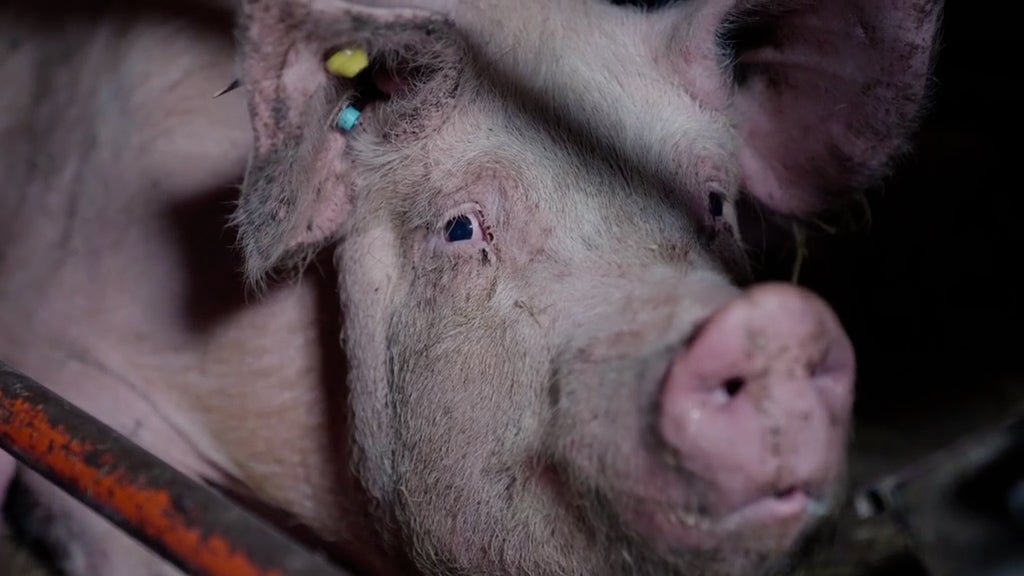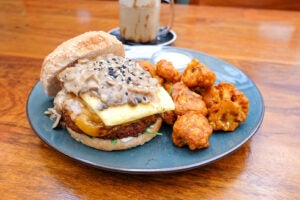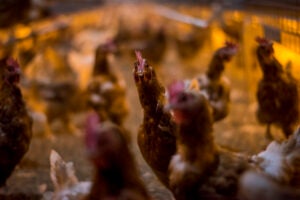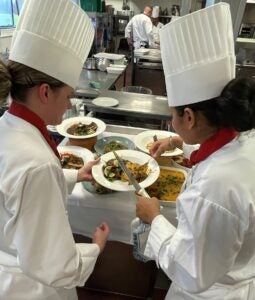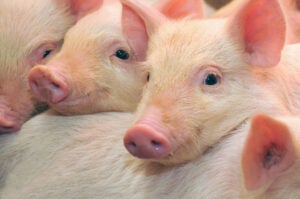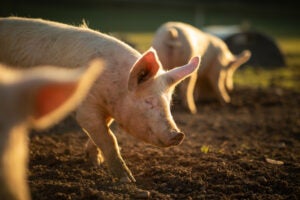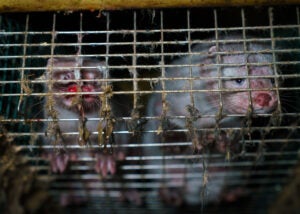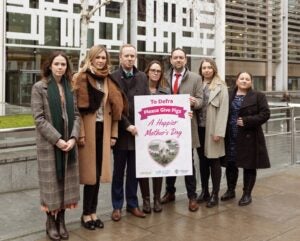
LONDON—New polling data shows that less than one in five people in Britain (19.8%) support the use of pig farrowing crates. Yet, every year on UK farms, over 200,000 mother pigs are confined for up to five weeks at a time in small cages in which they can’t even turn around.
Today, The Crate Escape campaign led by Conservative Animal Welfare Foundation, Humane Society International/UK and Compassion in World Farming held a Parliamentary reception hosted by Mark Francois MP calling on the UK Government to ban farrowing crates and support farmers to transition away from their use. The reception, which was attended by cross-party MPs and Peers, raised awareness of the suffering sows endure when they are forced to spend almost a quarter of their lives in cages so small, they cannot even turn around.
A giant Mother’s Day card signed by dozens of MPs, Peers and celebrities, including Dame Joanna Lumley, was delivered to Defra after the reception. The card asks Environment Secretary Thérèse Coffey to ‘please give pigs a happier Mother’s Day’ and urges her to deliver on the Government’s 2021 commitment to launch a consultation for a farrowing crate ban.
The reception coincided with the publication of a new Survation poll [1], carried out in March 2023, which also found that two-thirds of those polled would support the Government providing financial support to farmers to move to free-farrowing methods. Only 15.5% would presently oppose a ban on farrowing crates.
Speaking at the reception, Anna Firth, Conservative MP for Southend West, said: “Pig farrowing is one of the most inhumane, restrictive farming systems still in existence in the UK and the European Union. Pig farrowing crates have to go. […] I’m proud of the fact that this Government has introduced the Animal Health and Welfare Pathway, which amongst many things, pledges to explore reforming our use of pig farrowing crates. So we have a Government that’s committed to a future where this system is no longer necessary, which I commend, but what that means is that we must hold their feet to the fire, we must, all of us, urge this Government to continue putting pressure to make sure that this aim becomes a reality.”
Speaking at the reception, Shadow Defra Spokesperson Baroness Sue Hayman said: “These are mothers. I’m sure I’m not the only mother in the room, how would we feel if it was the practice to put us in a cage […] it’s an absolute outrage, there isn’t any other way of putting it. […] The Government has talked about [banning farrowing crates] so it is time that the UK caught up and actually started the process to make banning an actuality.”
Claire Bass, senior director of campaigns and public affairs at Humane Society International/UK, commented: “Pigs are intelligent and sensitive animals, and the torment they suffer while confined in tiny cages for weeks on end is heartbreaking. Our polling shows that the majority of Brits, over 60%, had not even heard of farrowing crates despite their widespread use. That’s a worrying indication of how disconnected consumers are from the grim reality for animals suffering on factory farms. If we’re truly a nation of animal lovers then we can and must do better than this, mothers should not be kept in cages.”
Lorraine Platt, co-founder of Conservative Animal Welfare Foundation, commented: “We were delighted to see Parliamentarians, NGOs, charities and campaigners come together as one voice in Parliament to call for an end to the use of farrowing crates in the UK. The Crate Escape reception was a clear display of the strong public and political will to end the suffering 60% of our national pig herd endure every year.
We would like to thank our host Mark Francois MP, as well as our other speakers including Conservative Animal Welfare Foundation Head of Research Dr Steve McCulloch, Shadow Defra Spokesperson Baroness Hayman, and our Patron Anna Firth MP. The Crate Escape will continue to support the Government’s aim for farrowing crates to longer be necessary, and we look forward to seeing this objective become a reality.”
James West, senior policy manager at Compassion in World Farming, commented: “Around 200,000 sows are confined in crates in the UK each year. Stuck in pens so narrow that they can barely move, mother pigs are forced to feed their piglets through bars. The use of these cruel cages causes unimaginable suffering.
The UK Government has promised to review the use of cages in British farming, and recent polling shows that the British public want a ban, with less than one in five people supporting the use of farrowing crates. It’s time for the Government to listen to public opinion and take the next step to facilitating The Crate Escape by finally publishing the long-awaited consultation.”
ENDS
Notes to editor
- Polling carried out by Survation via online panel, with 1,074 total respondents, on 2nd-3rd March 2023. Results released on 16th March 2023.

